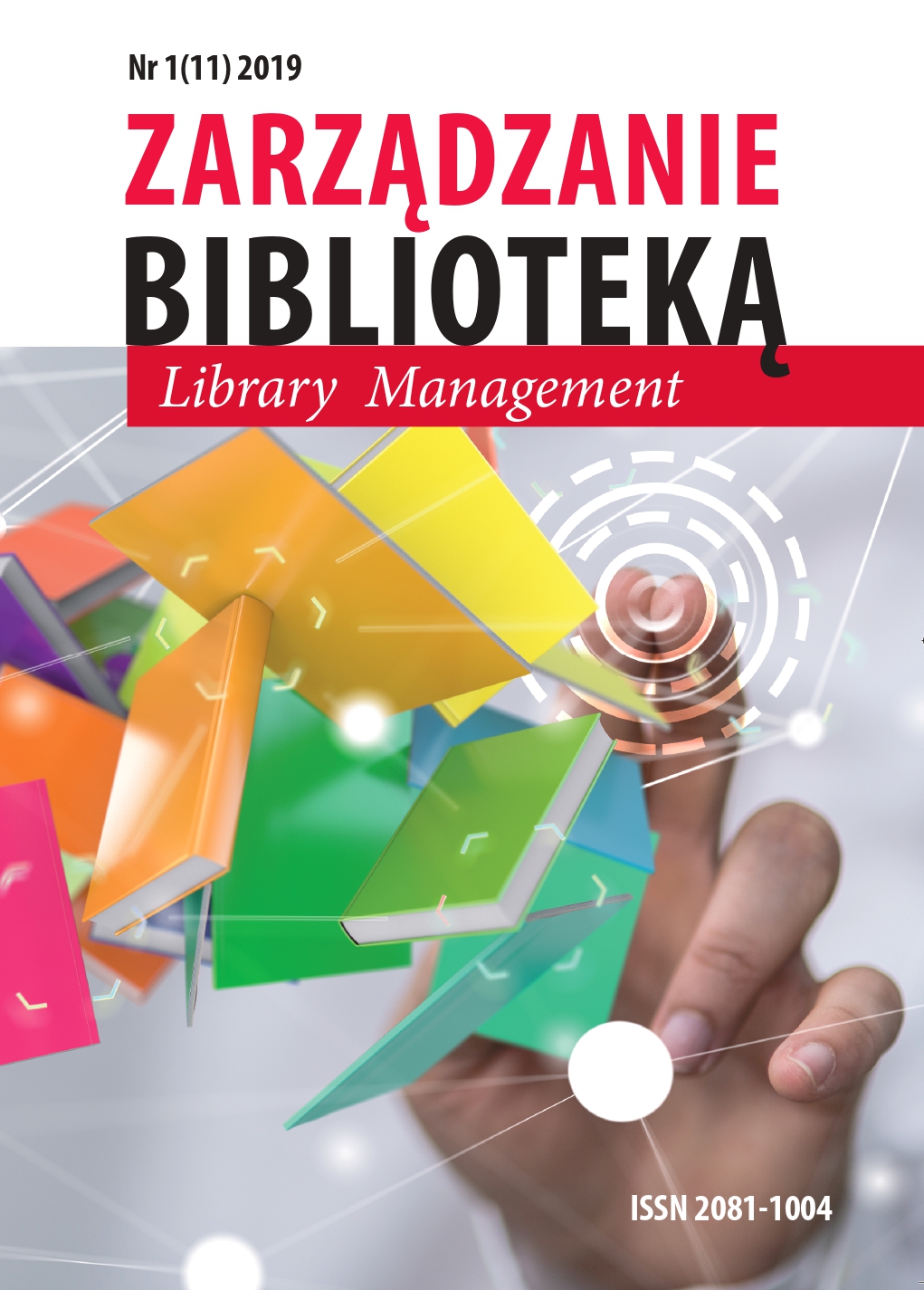Challenges of information literacy skills of undergraduate students in Ajayi Crowther University, Oyo State Nigeria
Słowa kluczowe:
undergraduate students, information literacy skills, information resourcesAbstrakt
Edukacja informacyjna i źródłowa jest istotnym elementem służącym rozwijaniu podstawowych umiejętności studentów w zakresie wyszukiwania informacji, jej selekcji, krytycznej oceny i efektywnego wykorzystania. Przedmiot ten jest zazwyczaj realizowany dla studentów w bibliotekach w ramach upowszechniania modelu uczenia się przez całe życie. Studenci napotykają problemy w procesie przekazywania i przyswajania umiejętności nauczanych przez bibliotekarzy. W niniejszym artykule poddano analizie wyzwania związane z kształceniem kompetencji informacyjnych wśród studentów Uniwersytetu Ajayi Crowther. W tym celu wykorzystano kwestionariusz ankiety. W obliczeniach zastosowano metodę procentową. Na podstawie wyników badań wyciągnięto wnioski i sformułowano zalecenia dla bibliotekarzy dotyczące ustawicznego kształcenia studentów w zakresie edukacji informacyjnej i źródłowej. Wykazano, że proces ten pozwala poszerzyć kompetencje informacyjne studentów oraz odpowiednio wykorzystać zasoby biblioteki.
Downloads
Bibliografia
ADELEKE Dare Samuel, EMEAHARA Evelyn Nkechi. Relationship between information literacy and use of electronic information resources by postgraduate students of University of Ibadan. Library Philosophy and Practice [Dokument elektroniczny]. 2016. Tryb dostępu: http://digitalcommons.unl.edu/cgi/viewcontent.cgi?article=3788&context=libphilprac. Stan z dnia 10.09.2019.
Association of College and Research Libraries. 2008. Guidelines for instruction programs in academic libraries [Dokument elektroniczny]. Tryb dostępu: http://www.ala.org/ala/mgrps/divs/acrl/standards/guidelinesinstruction.cfm. Stan z dnia 05.09.2019.
AUFI Ali, AL-AZRI Hamed. Information Literacy in Oman’s Higher Education: A Descriptive-Inferential Approach. Journal of Librarianship and Information Science [Dokument elektroniczny]. 2013, s. 2–12. Tryb dostępu: http://lis.sagepub.com/contenet/early/2013/05/08/096100061348624. Stan z dnia 04.07.2019.
BRAIMOH D, JEGEDE O., CHADZINWA M.M. Library utilization and academic growth: an assessment of the National University of Lesotho. African Journal of Library, Archival and Information Science. 1977, nr 1, s. 63–69. ISSN 0795-4778.
BROWN Gavin. Information literacy curriculum and assessment: implications for schools from New Zealand. In: HENRI James, BONANO Karen (red.). The Information Literate School Community: Best Practice. Wagga Wagga: Charles Sturt University, Centre for Information Studies, 1999, s. 57–77. ISBN 0949060879.
BRUCE Christine. Seven faces of information literacy: Towards inviting students into new experiences [Dokument elektroniczny]. Tryb dostępu: http://kennison.name/files/zopestore/uploads/libraries/bruce-7- faces.pdf. Stan z dnia 14.08.2019.
BUCHER Katherine T. The importance of information literacy skills in the middle school curriculum. The Clearing House. 2000, nr 4, s. 217–220. ISSN 0009-8655.
BUNDY Alan (red.). Australian and New Zealand Information Literacy Framework: Principles, Standards and Practice. 2nd ed. Adelaide: Australian and New Zealand Institute for Information Literacy, 2004. ISBN 1-920927-00-X.
Colorado Educational Media Association. (1994). Information Literacy Guidelines Colorado State Department of Education: State Library and Adult Education Office, Denver, CO. ED 381163.
GOAD Tom W. Information Literacy and Workplace Performance. Westport: Quorum Books, 2002. ISBN 1-56720-454-6.
GROSS Melissa, LATHAM Don. Undergraduate Perceptions of Information Literacy: Defining, Attaining, and Self-Assessing Skills. College and Research Libraries. 2009, nr 4, s. 336–350. ISSN 0010-0870.
HARRIS Frances Jacobson. Information literacy and instruction: information literacy in school libraries. Reference & User Services Quarterly. 2003, nr 3, s. 215–223. ISSN 1094-9054.
KAVULYA Joseph M. Challenges facing information literacy efforts in Kenya: a case study of selected university libraries in Kenya. Library Management. 2003, nr 4/5, s. 216–222. ISSN 0143-5124.
LECKIE Gloria, FULLERTON Anne. Information literacy in science and engineering undergraduate education: faculty attitudes and pedagogical practices. College & Research Libraries. 1999, nr 1, s. 9–29. ISSN 0010-0870.
LENOX Mary F., WALKER Michael L. Information Literacy in the Educational Process. The Educational Forum. 1993, nr 3, s. 312–324. ISSN 0013-1725.
LICHTENSTEIN A. A. Informed Instruction: Learning Theory and Information Literacy. Journal of Educational Media and Library Sciences. 2000, nr 1, s. 22–31. ISSN 1013-090X.
MISHRA R. N., MISHRA C. Relevance of information literacy in digital environment. Journal of Emerging Trends in Computing and Information Sciences. 2010, nr 1, s. 48–54. ISSN 2079-8407.
MITTERMEYER Diane. Incoming first year undergraduate students: how information literate are they? Education for Information. 2005, nr 4, s. 203–232. ISSN 0167-8329.
OKON Michael E., ETUK Elijah P., AKPAN Uwem J. Information literacy skills and information use by students in two south university libraries in Nigeria. International Journal of Economics, Commerce and Management. 2014, nr 9, s. 1–16. ISSN 2348-0386.
PEACOCK Judith. Standards Curriculum and Learning: Implications for Professional Practice. Library Quarterly. 2004, nr 5, s. 329–345. ISSN 0024-2519.
RABIN Julie, CARDWELL Catherine. Start making sense: practical approaches to outcomes assessment for libraries. Research Strategies. 2000, nr 4, s. 319–335. ISSN 0734-3310.
RADER H.B. Information Literacy: A Revolution in the Library. RQ, fall. 1991, s. 25–29.
SALLEH Mohd I., YAACOB Raja A., HALIM Ahmad A., YUSOFF Zulkarnain. Measuring the effect of Information Literacy on the Undergraduates’ Academic Performance in Higher Education. In 2011 International Conference on Science and Humanity IPDER [Dokument elektroniczny]. 2011, vol. 5, s. 507––510. Tryb dostępu: https://www.academia.edu/8413871/Measuring_The_Effect_of_Information_Literacy_on_the_Undergraduates_Academic_Performance_in_Higher_Education. Stan z dnia 10.11.2019.
SASIKALA Chagari, DHANRAJU V. Assessment of Information Literacy Skills among Science Students of Andhra University. Library Philosophy and Practice. 2011, nr 1, s. 1–28. ISSN 1522-0222.
TELLA Adeyinka. Information Literacy and Lifelong Learning: A Review of Literature. In KEENGWE Jared (red.). Promoting Active Learning through the Integration of Mobile and Ubiquitous Technologies. Hershey: IGI Global, 2015, s. 230–243. ISBN 9781466663435.
TODD Ross J. Integrated information skills instruction: does it make a difference? School Library Media Quarterly. 1995, nr 3, s. 177–184. ISSN 0278-4823.
USMANN N. Information Literacy: The instrument for political and Economic empowerment in Nigeria. Nigeria International Journal of Research in Education. 2005, nr 2, s. 189.
VARLEJS Jana, STEC Eileen. Factors Affecting Students’ Information Literacy as They Transition from High School to College. Research Journal of the American School Librarians. 2014, nr 17, s. 1–23. ISSN 2165-1019.

 Uniwersyteckie Czasopisma Naukowe
Uniwersyteckie Czasopisma Naukowe




